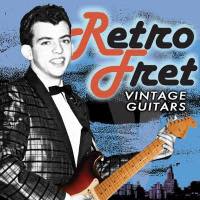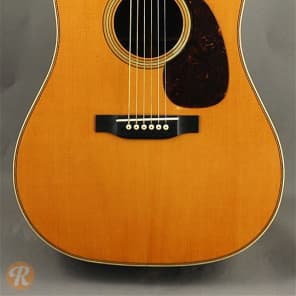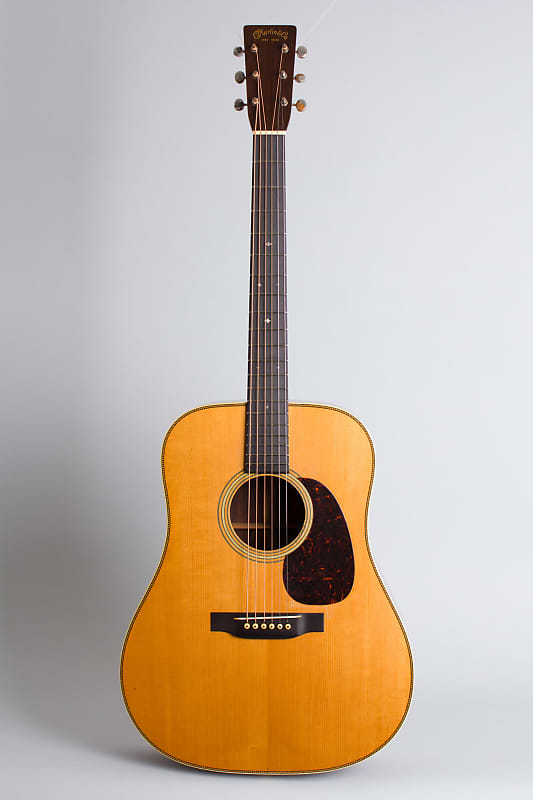

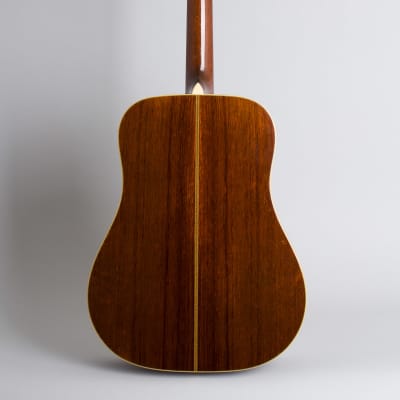
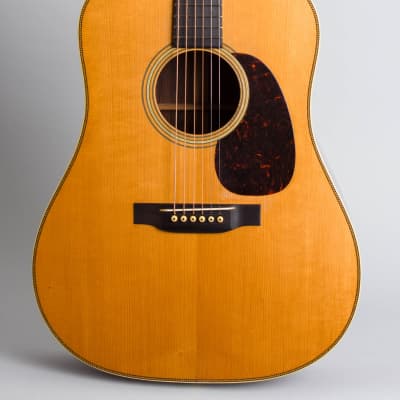
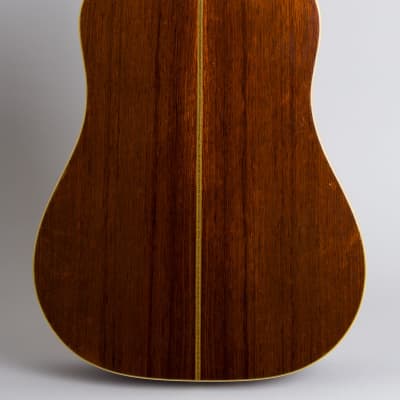
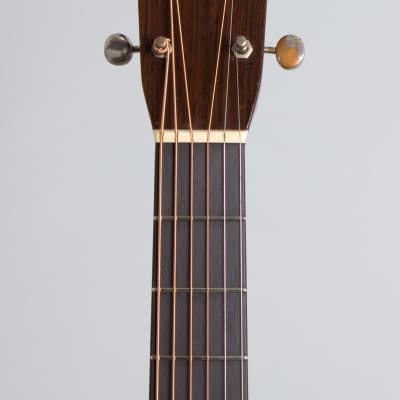
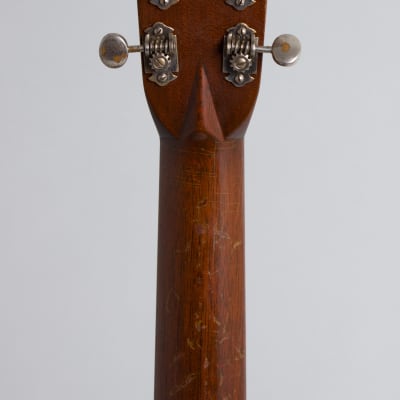
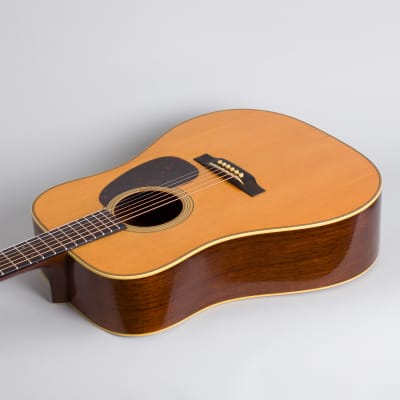
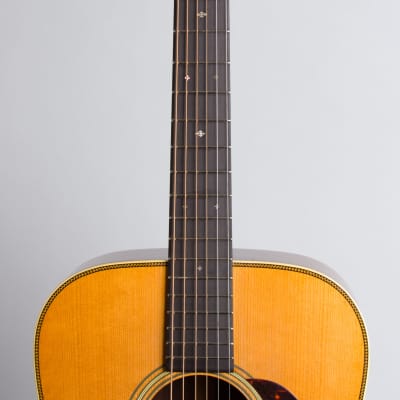
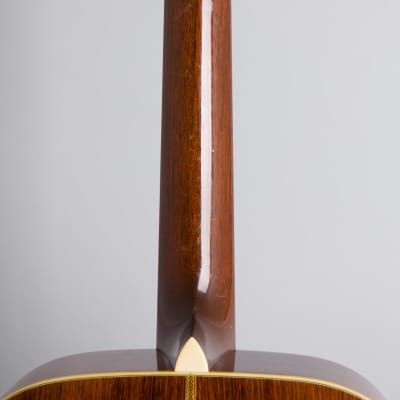
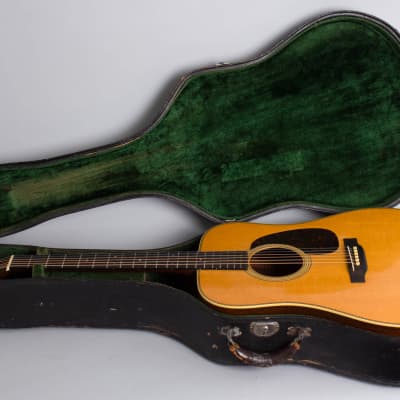
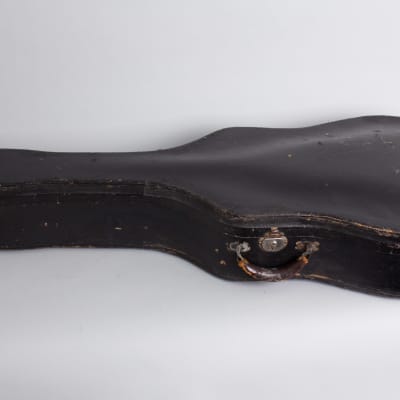
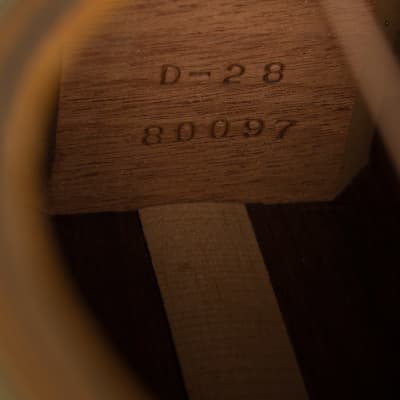
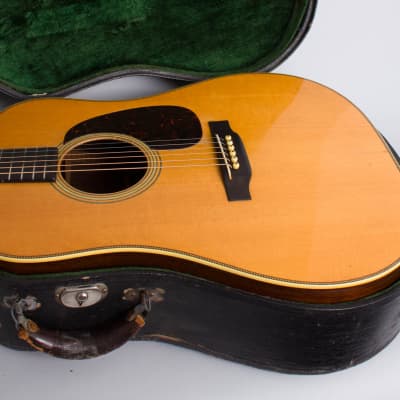
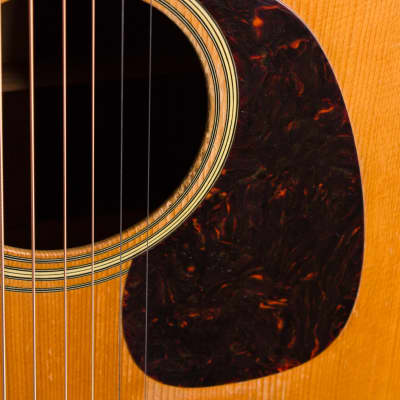
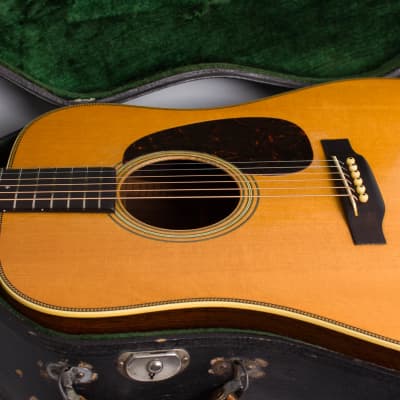
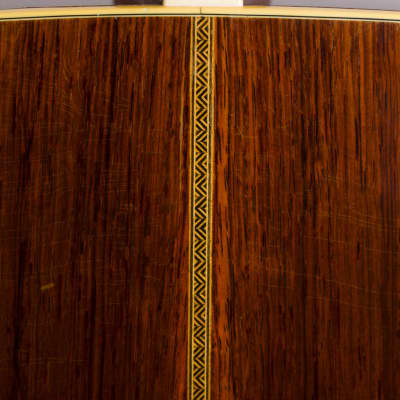
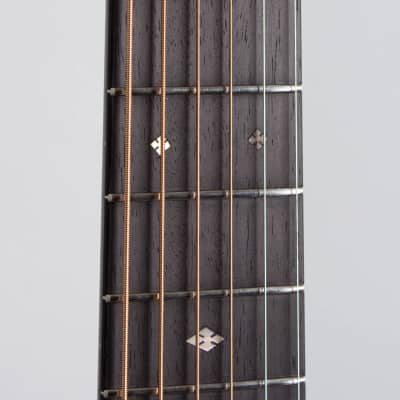
C. F. Martin D-28 Model Flat Top Acoustic Guitar (1942), made in Nazareth, PA, serial # 80097, natural lacquer finish, Brazilian rosewood back and sides, spruce top; mahogany neck with ebony fingerboard, original black hard shell case. This is an amazingly well preserved example of a guitar that is simply a standard by which all others are judged: the Martin D-28 "herringbone". This example shows far less wear and repair than most, a fantastic survivor more than 80 years along. This early 1940s instrument still shows the original classic features of the model which have been widely imitated ever since. This D-28 is from one of the first few batches guitars built in Nazareth during January 1942, just after the US entered WWII. Serial number 80013 was the last one logged for 1941; this D-28 carries 80097. These are often referred to as a "bone", after the namesake "herringbone" wood marquetry trim around the top. Whether this cosmetic feature has any affect on the sound is a hotly debated question; Martin stopped using it on their instruments by mid-1947 as their supply ran out. By then the D-28 had seen a number of other changes, most importantly the discontinuation of the scalloped top braces. The instruments of the 1940's and '50's evolved to have a different sonic character, but some players found they preferred the older ones, giving rise to a still-active cult..The other features of this guitar are still classic prewar D-28 appointments. Although technically a "wartime" guitar (by about a month) it does not yet show any changes from WWII restrictions. The top bracing is the rearward shifted pattern adopted in 1939, still delicately scalloped with top construction lighter than the typical 1950's style. The back and sides are beautifully grained Brazilian rosewood, with more "striping" to the back than many period Style 28s. The top is lovely Appalachian spruce, the small "teardrop" shape pickguard just below the sound hole is made of tortoise celluloid. The ebony bridge is the typical Martin "belly" shape with a canted bone saddle.The neck is mahogany with an unbound ebony fingerboard decorated with discreet slotted diamond pearl inlay. The peghead is faced in straight grained Brazilian rosewood with the "C.F. Martin & C." decal at the top. The neck profile is round backed but with a subtle "V" profile in the way the sides bear away from the center as it moves towards the nut. The neck still has the standard metal reinforcement; wartime restrictions on steel causing this to be deleted were not yet in place. The tuners are an openback Waverly style typical of the late pre-war period with round metal buttons.Cosmetically this guitar shows only fairly light signs of play, at least compared to many other Martins of this period. Playing into the open mikes of radio studios and barn dance stages a guitar had to have the maximum of both depth and projection, and many Country and Western performers of the period (accent on "Western") found the Martin D-28 the best instrument available for this highly competitive musical environment. Costing an even $125 in 1941-2 (without case!) the D-28 represented a sizable investment for a working performer, and once obtained was often played constantly to literally put food on the table.This example is one of only 183 D-28s shipped in 1942 and bears a shop decal on the back of the headstock indicating it was sold originally by Bergstrom Music, Martin's dealer in Honolulu. It is amazing to think that so soon after the Pearl Harbor attack this guitar was making its way to Hawaii! It is quite likely that the tremendous influx of military personnel into the islands resulted in a increased demand for instruments at Bergstrom's store. In any case compared to modern production this is a very paltry number, by the 1970s many thousands od Dreadnoughts were built every year. The mahogany-bodied D-18 cost somewhat less at $83 and so was sold in much larger numbers (575 shipped in 1942) but for many the D-28 represented the ultimate stage guitar. In the minds of most acoustic guitar players, collectors and historians very few instruments even approach the pantheon of the pre-war rosewood Martin Dreadnought in terms of both sound and historical importance. The scallop-braced D-28 is, to many, as close to a perfect flat top guitar as has ever been made. In the period when they were built these instruments were judged by the rhythm they produced to power the whole group; the kind of solo hot picking' that characterizes the modern audience for these guitars was generations away. Although the D-28 has long been considered the definitive Bluegrass guitar, when this one was made "Bluegrass" as a defined musical style did not exist. In 1942 Bill Monroe's first so-named band was actively performing, but it was not until later in the 1940's that the "classic" Monroe band with Lester Flatt on a D-28 established that paradigm. If you want that sound, this guitar has it in s
Reverb Buyer Protection
Reverb has your back if your item is lost, damaged, or doesn't match its description. Simply report any issues within 7 days and we'll help you get a full refund.Learn more about Reverb Buyer Protection.
| Listed | 5 months ago |
| Condition | Excellent (Used) Excellent items are almost entirely free from blemishes and other visual defects and have been played or used with the utmost care.Learn more |
| Brand | |
| Model |
|
| Finish |
|
| Categories | |
| Year |
|
| Pickup |
|
| Series |
|
| String Type |
|
| Right / Left Handed |
|
| Number of Strings |
|
| Neck Material |
|
| Wood Top Style |
|
| Body Shape |
|
| Back Material |
|
| Sides Material |
|
| Finish Style |
|
| Top Material |
|
| Fretboard Material |
|
| Model Family |
|
| Color Family |
|
| Active Preamp |
|
| Number of Frets |
|
